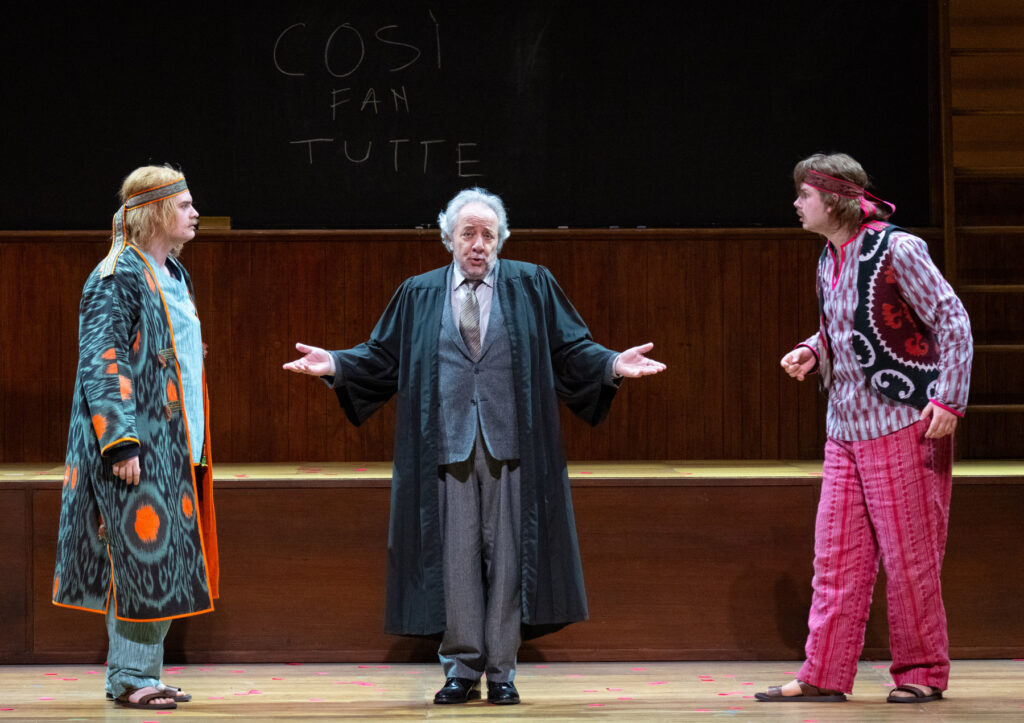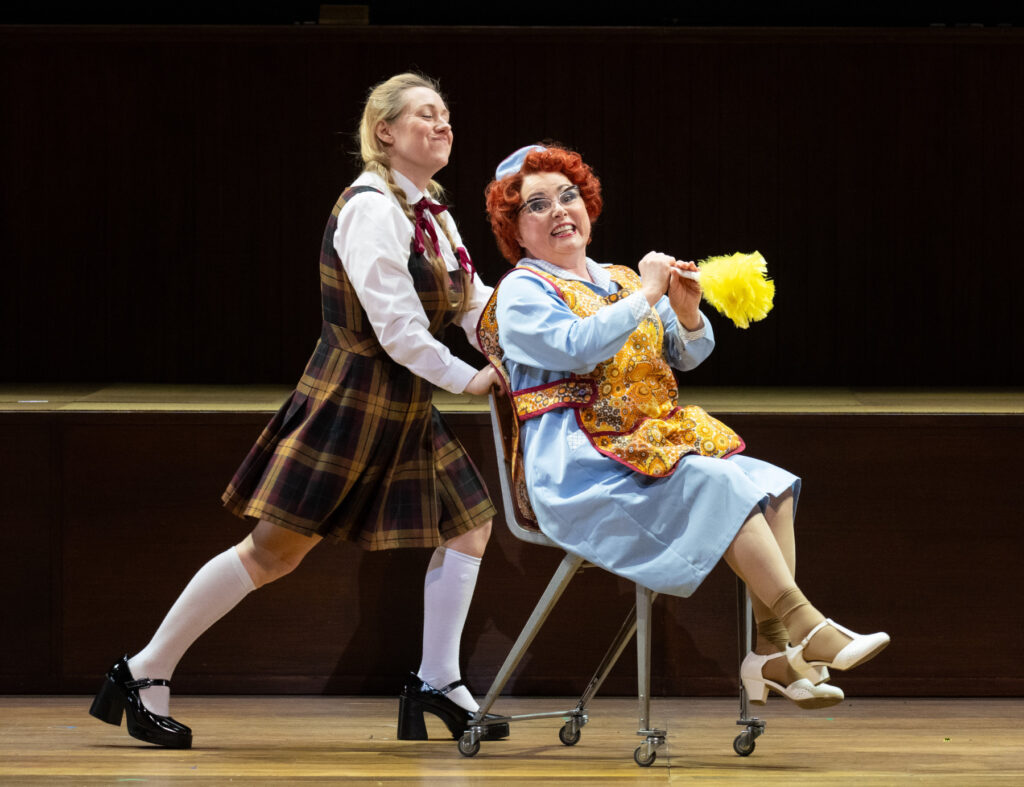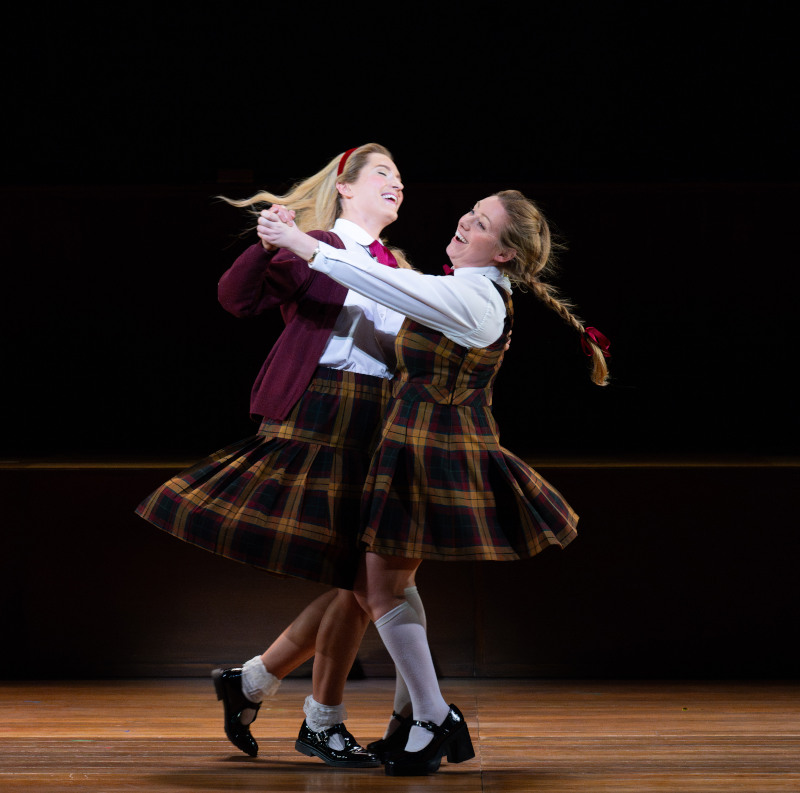Dismissed by Beethoven and Wagner, Così fan tutte has taken nearly two centuries to emerge from society’s censor and for Mozart’s genius for expressing human nature through sublime music to be fully appreciated. Nearly a century ago, Sir Thomas Beecham regarded this collaboration between composer and librettist as “a long summer day spent in a cloudless land by the southern sea”. No hint of the Bay of Naples here, or any azure skies in this Welsh National Opera staging. Mozart’s romp of sexual manipulation is reimagined by director Max Hoehn as a progressive coeducational school (somewhere between St Trinian’s and Greyfriars of Billy Bunter notoriety) intended to underline the opera’s subtitle La Scuola degli Amanti – The School for Lovers. Sadly, and distractedly, this ‘Carry On’ style caper may have been amusing last century, when one might have roared at the antics of Joyce Grenfell and Sid James, but the idea is now well passed its sell by date.
Misgivings about this flawed concept began with the Overture where members of the chorus – short-trousered boys in blazers and long-legged girls in gymslips wielding hockey sticks, lugging anatomical drawings, cut-out figures of Adam and Eve and phallic fruit and veg – arrived on the single set (multi-tasking as an assembly hall, cafeteria and classroom). Who can blame the Victorians for thinking Così was a pointless, rather unsavoury farce with inexplicably wonderful music? Yet the brilliance of Mozart’s opera is his genius for creating musical sense from dramatic nonsense without any incongruity. This apparent contradiction is lost on Hoehn who merely trivialises all the drama and irony. The one meaningful element – a display of a cardboard head adorned with the words instinct and reason – was never exploited and was mostly dwarfed by a surplus of tiresome clutter that quickly outstayed its welcome. Hoehn and his designer, Jemima Robinson, clearly like stage filling impedimenta as seen last summer in their L’elisir d’amore at Longborough – reviewed by Claire Seymour.

That said, musical relief came in some convincing chemistry between the principals and several wonderfully sung arias and ensembles, although most of these were best experienced with one’s eyes firmly shut. There were some fine characterisations too, chief amongst which was Rebecca Evans’s comic Despina who revelled in her roles as dinner lady, faux doctor and marriage notary, each portrayal increasingly outlandish and enhanced by crisply delivered singing. One cannot be so positive about Portuguese baritone José Fardilha whose Don Alfonso, arguably the only real person in Così, as a cynical schoolmaster was stolid and (on the afternoon I attended) had a tendency to sing sharp as the performance wore on.

Amongst the four young lovers, Sophie Bevan was an impressively steadfast Fiordiligi, her Mozartian purity and gleaming coloratura a constant delight, and the demands of ‘Come scoglio’ and ‘Per pietà’ confidently met. Her anguish in the latter was an emotional highwater mark. She was well matched in Kayleigh Decker’s fruity and impressionable Dorabella (with socks round her ankles hinting at her rebellious nature), who clearly enjoyed herself in ‘Smanie implacabile’. A persuasive partnership was evident by the two men (although their roles needed greater delineation) who morphed from naïve sixth formers to Sixties hippies. Egor Zhuravskii’s Ferrando brought suitable ardour to the heart-easing ‘Un’ aura amorosa’, while James Atkinson’s Guglielmo rang out compellingly in his chauvinistic ditty that ‘Donne mie la fat a tanti a tanti’. Ensemble numbers were well executed, most rewardingly in Act One’s Farewell Quartet.

Despite some fine singing, Act Two dragged interminably, its closing marriage ceremony bringing uncertainty for the two couples, the sudden descent into seriousness distinctly out of sorts with the overall vulgarity of the production. This talented cast deserve better than this cheap entertainment. On the plus side, there were some standout moments with conductor Frederick Brown drawing mostly clean, characterful playing that illuminated Mozart’s felicitous writing. Performances continue in Bristol and Birmingham until May 10.
David Truslove
Così fan tutte
Music by Wolfgang Amadeus Mozart
Libretto by Lorenzo da Ponte
Fiordiligi – Sophie Bevan, Dorabella – Kayleigh Decker, Ferrando – Egor Zhuravskii, Guglielmo –James Atkinson, Don Alfonso – José Fardilha, Despina – Rebecca Evans, Director – Max Hoehn, Conductor – Frederick Brown, Designer – Jemima Robinson, Lighting Designer – Mark Jonathan, Staff Director – Sarah Crisp, Movement Director – Michael Spenceley, Orchestra and Chorus of Welsh National Opera
The Mayflower, Southampton, Saturday 23 March 2024
Top Image: Cast of Così fan tutte
All photos by Elliott Franks courtesy of Welsh National Opera